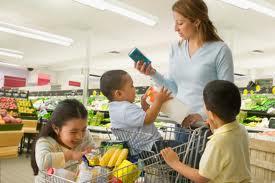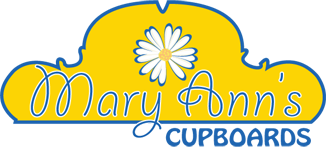The Supermarket Classroom - Part 3

"Listen, da da da, Do you want to know a secret? da da da "
You probably won’t recognize those lyrics unless you have gray hair, but they seemed appropriate as we unlock more secret benefits found in the supermarket. Going to the grocery store can be a wonderful (but largely unrecognized) venue for fostering reading and pre-reading skills, developing math competencies, and fostering social and ethical values.
Let me explain:
Reading begins with listening and speaking and leads to reading and writing competencies.
 Listening: Have your child close his eyes and listen carefully to the sounds in the store—e.g. voices, music, sounds from the cash register, meat slicing machines, conversations or goods being stocked on shelves. Auditory discrimination is a baseline key to reading skill development. Giving simple instructions that your child can follow can also encourage this growth. Eventually, you will be able to ask him to get the smallest can of the vegetable that starts with a "C,” tell you the price, and put it in the back of the cart. That is a very sophisticated direction for a young child, but you will evolve to that level of understanding.
Listening: Have your child close his eyes and listen carefully to the sounds in the store—e.g. voices, music, sounds from the cash register, meat slicing machines, conversations or goods being stocked on shelves. Auditory discrimination is a baseline key to reading skill development. Giving simple instructions that your child can follow can also encourage this growth. Eventually, you will be able to ask him to get the smallest can of the vegetable that starts with a "C,” tell you the price, and put it in the back of the cart. That is a very sophisticated direction for a young child, but you will evolve to that level of understanding.Help your child recognize upper and lower-case letters and tell you the sound each letter makes. This ability to hear individual sounds, whether it’s the initial, middle, or ending sound is identifying phonemes—the starting point for phonics.
 Speaking: Talk with you child while you roam the aisles. Point out the section you are in and the products that can be found there. Ask questions so that he can practice speech. As he gets older, he can be the one who asks a clerk where to find an item or its price.
Speaking: Talk with you child while you roam the aisles. Point out the section you are in and the products that can be found there. Ask questions so that he can practice speech. As he gets older, he can be the one who asks a clerk where to find an item or its price.This is also an opportunity to model and coach your child to use polite speech—please, thank you, excuse me, I’m sorry, etc. Encourage him to look directly at other customers and store personnel and offer a greeting. There is too much ignoring others going on these days!
 Reading: You can start with the ads. Read to or with your child, running a finger under the words. This helps children to understand that we start on the left and read to the right. Awareness of where to start reading and how to proceed is important. As his abilities grow, compare store ads to find the best buys. This, of course, will eventually lead to writing the grocery list.
Reading: You can start with the ads. Read to or with your child, running a finger under the words. This helps children to understand that we start on the left and read to the right. Awareness of where to start reading and how to proceed is important. As his abilities grow, compare store ads to find the best buys. This, of course, will eventually lead to writing the grocery list.Many grocery-store-reading skills help develop math readiness: recognizing shapes, identifying numbers, counting, money, weight, length, and volume awareness.
Reading the words on the package can include the brand name (explain store brands), the ingredients, and nutritional information. At home, your child can read the instructions for preparation and assist with the task. This is particularly appealing when the item is something like a cake mix!
 Writing: So, we’ve mentioned the grocery list. Your child can start with this task long before the creative spelling stage is over. It’s always fun to try to figure out what he meant by "skwch!” (Squash, of course.) Thus, the necessity of including your child on the shopping trip.
Writing: So, we’ve mentioned the grocery list. Your child can start with this task long before the creative spelling stage is over. It’s always fun to try to figure out what he meant by "skwch!” (Squash, of course.) Thus, the necessity of including your child on the shopping trip.There is a great advantage to having your child start their own journal. Self-expression, vocabulary, and eventually spelling are all enhanced with the written word. The grocery store excursion may not be on your favorite destination list. But, it can certainly become a trip worth writing about for a child. When you review the topics to include in the weekly or daily journal entries, just remind him of the outing and what he learned. Writing transfers information to a different, more accessible part of the brain. (Don’t want him to forget the lesson on Cocoa Puffs, do you?)
Even more than important than academic development is the pattern of honesty, integrity, and kindness that you can foster as your child sees you at the check-out counter. Do it well, and explain your actions. Don’t assume he will intuit how to handle situations and make the right decisions. State that you were given too much money or charged a reduced price that wasn’t appropriate. Allow the lady with the crying child or only a few items in the cart to go first. Put some money in the can to help a family who lost their home. Buy one of those little signs that show you contributed to a worthy foundation. Each of these acts generates feelings of self respect and models a positive approach to living. What a sweet gift to give a child!
So, we’re done for today. Keep aware of all the good things that can happen for your child as you roam the grocery aisles. Happy shopping. Happy teaching. You are, you know, your child’s first and most important teacher. Go Mom!!
Tags: Learn read write teach fun
|
Add a Comment |
For all news items click here
News Releases
An Organized Kitchen & Pantry Saves You Money! Sometimes we get overwhelmed by the clutter that over-runs our kitchens! Mary Ann gives us some money-saving motivation for keeping our kitchens and pantries clutter-free. Release Date: 4/12/2023 | |
Your Shopping List Ya, ya, I know what you are thinkin, "why do I need to read about a shopping list?" Because you want to spend LESS time in the grocery store, LESS energy, have LESS stress, and spend LESS money. Am I right? Using a shopping list will help you get in and out of the store faster and spend less money because you are NOT making spontaneous purchases, but rather buying what your family actually needs. Release Date: 4/10/2023 | |
Digitally Filed...Or Lost in Cyber Space? Melanie shows us a quick way to organize our files digitally so they are easily found and never lost again! Release Date: 4/8/2023 | |
Online Classes
Clutter Free Living E-Learning Class
Every house has storage issues regardless of it's size. Double your storage space with simple principles that will keep your house clutter-free all day, everyday.
Every house has storage issues regardless of it's size. Double your storage space with simple principles that will keep your house clutter-free all day, everyday.
A Grocery Store in Your Home, e-learn
Basic principles that help you make smart, economical decisions about food storage.
Basic principles that help you make smart, economical decisions about food storage.
Powdered Milk E-Learning Class
Learn how fast and easy it is to make all of your dairy products at home!
Learn how fast and easy it is to make all of your dairy products at home!
Upcoming Classes
No events scheduled at this time.
Calendar View
Featured Products
Find us on FaceBook






